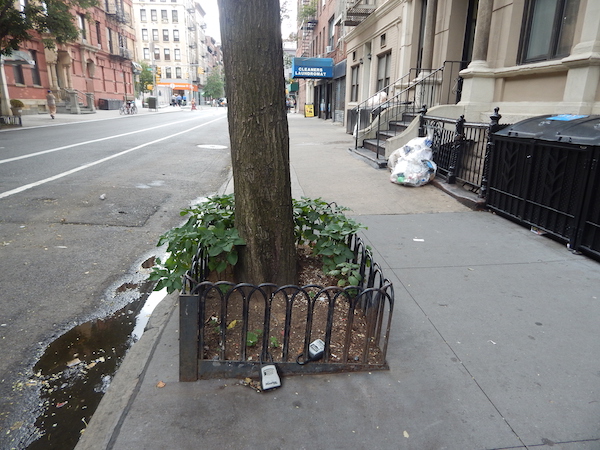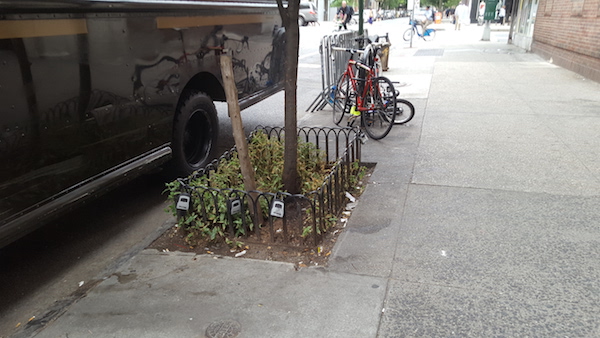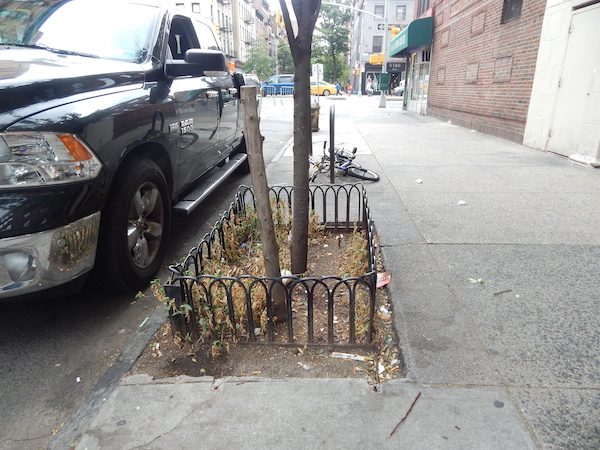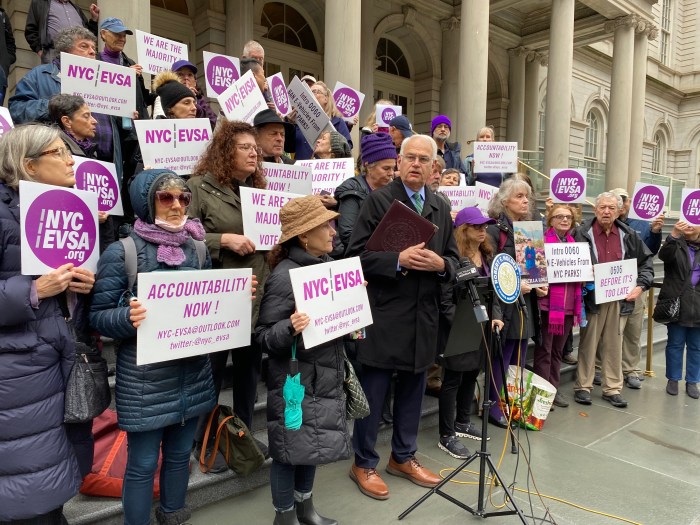
BY DUSICA SUE MALESEVIC | Call it the case of the vanishing key lockboxes.
Since Chelsea Now’s July 20 article about key keepers on and around W. 21st St. (btw. Eighth & Ninth Aves.), several have been removed.
Pamela Wolff, a longtime resident of W. 21st St., said there has been a drastic decrease in key lockboxes — often used by those putting their apartment on short-term rental sites — on her block.
“There is only one left,” she said in a phone interview on Aug. 2. “They’ve all disappeared.”
Wolff said at one point, a single building toward Eighth Ave. had four or five key keepers latched to the stoop, but when she checked recently, they were gone.
The lockboxes are a way for a host to get keys to a guest without being present. A guest is given the combination to the keeper, which contains the keys to the building and the residence.
Chelsea Now first counted the key lockboxes on Wed., July 13, and found 11 on W. 21st St., just on the block between Eighth and Ninth Aves. On a recent visit, Thurs., Aug. 4, there were seven (four between Seventh and Eighth Aves., and none between Sixth and Seventh Aves.). Returning to W. 21st St. on Wed., Aug. 10, there were none between Sixth and Seventh Aves., six between Seventh and Eighth Aves., and seven between Eighth and Ninth Aves.
In front of 300 W. 21st St., four lockboxes once rimmed the perimeter of a tree guard, but last week they were gone. Zev Feldstein, the building’s landlord, said he has “no idea” when the lockboxes were put there or when they were removed.
“Airbnb is illegal. I’m hoping none of my tenants are doing it,” he told Chelsea Now in an Aug. 5 phone interview.
Bill Borock, President of the Council of Chelsea Block Associations (CCBA), said in a phone interview that a lot of block associations in West Chelsea spend time on beautification efforts, such as installing flowerboxes and tree guards.
“To see lockboxes on the tree guards — it’s visual pollution,” Borock said. “It’s not nice to look at.”
Prices for tree guards can range from $800 to $1,000, according to a Parks Department spokesperson on background in an email.
People are not allowed to affix the lockboxes to tree guards, and could receive a summons of between $100 to $400 for doing so, according to the Parks spokesperson. Due to a typo in a statement from Parks to Chelsea Now, our July 21 article indicated that “current policy does not consider the presence of key keeper boxes to be an unauthorized use of Parks property.”
Borock said that lockboxes being used to facilitate short-term rentals is both a quality of life and safety issue, and that when CCBA meets in September, it will be discussed.

All access passed: Key lockboxes were attached to a tree guard on W. 21st St. (btw. Eighth & Ninth Aves.) on July 13 (above photo, by Dusica Sue Malesevic), but were gone by Aug. 10 (below photo, by Jane Argodale).

According to Parks, they have not received any complaints about the lockboxes, but they can be tagged and removed like abandoned bikes.
Currently, there are no open complaints in the Department of Buildings’ information system for that area of W. 21st St., said a spokesperson for the Mayor’s Office of Criminal Justice on background. The Mayor’s Office of Criminal Justice handles press inquiries for the Mayor’s Office of Special Enforcement (MOSE), which responds to complaints and 311 calls about illegal hotels.
In February, MOSE issued a violation at 350 W. 21st St. in response to a complaint about transient rentals, according to the spokesperson.
Jesse Bodine, district manager for Community Board 4 (CB4), said that a letter — addressed to the Department of Sanitation and the NYPD — is in the works about the possible tagging of the key keepers on public property for removal. The letter will also touch upon safety concerns, Bodine said in a phone interview.
“You’re leaving [out] keys, no matter how well-protected,” said Bodine, adding that it puts everyone in the building at risk.
There were five robberies this year compared with none for last year for the week of July 25th to the 30th, according to NYPD’s CompStat for the 10th Precinct. There were 18 grand larcenies this year compared with 12 last year, while there were no burglaries compared to two the year before, according to CompStat.
Chelsea Now asked the NYPD if there were any crimes associated with the key lockboxes, but was told via email that crimes are not tracked to that level of specificity.
Brice Peyre, spokesperson for New York State Assemblymember Richard Gottfried, said in an email that his office had been in contact with the 10th Precinct, and officers are not aware of any criminal incidents related to the key lockboxes.
State Senator Brad Hoylman said in an email statement, “Constituents have contacted my office to express concerns about their buildings being less secure, since anyone can guess what’s inside once they know what a key box looks like. It’s yet another way that illegal hotel use puts long-term tenants at risk.”
Hoylman said the lockboxes were just one symptom of the bigger problem of illegal hotel use, and that “keeping New Yorkers in their long-term homes and maintaining the affordable housing stock is an absolute priority.”
CB4’s Bodine said he would bring this issue up to the chairs of the board’s Housing Committee.
“We obviously feel very strongly about affordable housing,” Bodine said, noting that once an affordable unit is lost, it is gone forever.
City Councilmember Helen Rosenthal, who represents the Upper West Side, pointed to a report commissioned by the Housing Conservation Coordinators that an estimated 8,000 units citywide were removed from the market and used for short-term rentals on Airbnb.
The report, titled “Short Changing New York City: The Impact of Airbnb on New York City’s Housing Market” was released in June, said Sarah Desmond, executive director of Housing Conservation Coordinators, a non-profit that focuses on affordable housing located at 777 10th Ave. in Hell’s Kitchen.
“The issue of these key lockboxes is facilitating the illegal rentals,” Desmond said in a phone interview.
Peter Schottenfels, an Airbnb spokesperson, disputed the report’s findings, saying that the data it is based on “is fundamentally flawed because it doesn’t accurately reflect when a listing was available.”
Schottenfels put Chelsea Now in touch with Chris Gatto, an East Village resident for 15 years who has been using Airbnb for around five years. Gatto lives in a two-bedroom apartment and is always present while a guest stays at his place.
In the state of New York, it is illegal to rent out an entire apartment for less than 30 days, however; it is legal to rent if the tenant is present.
Gatto says he does not use key lockboxes and greets guests when they come — going over his house rules, which include being kind and respectful toward his neighbors and not being noisy.
“My experience is most unanimously 100 percent positive,” he said in a phone interview.
Gatto said he would be apprehensive about leaving a lockbox, and he would have concerns if one of his neighbors left a key keeper.
Rosenthal, who is a member of the City Council’s Committee on Housing and Buildings, said she has asked the city to look into the key lockboxes, and for MOSE and Parks to work together on this issue.
“They could be indications of where an illegal hotel could be,” she said. “It also could be something legitimate.”
Construction companies and realtors have been known to use key lockboxes, and Chelsea Now reached out to brokers to see how frequently the keepers are used.
“It’s as rare as snow in the middle of August,” said Aviv Zumin, a licensed real estate broker for 10 years and president of FirstService Realty. FirstService Realty manages over 100 condos and co-ops, and 10 to 15 residential buildings in Chelsea, Zumin said.
Landlords often tell their superintendents to remove lockboxes, as it could be an indicator that a tenant may be putting their apartment on a short-term rental site, he said in a phone interview.
“You don’t want to put an apartment key in a lockbox that is not very protected,” said Zumin. “There is no reason to have a lockbox. The only reason is to have people coming in at 10 o’clock at night from JFK.”
Douglas Wagner, director of brokerage services for BOND New York Properties, LLC, said in an email that there are “one out of two thousand landlords and management companies who use key boxes as a regular operations policy.”
He said landlords don’t like brokers to use the key keepers because agents forget to return them or lose the keys.
“Landlords fear the risk of squatters or other potential illegal occupants getting possession of a key in order to take over an empty apartment,” said Wagner, who has been in the real estate business for 21 years.
Hell’s Kitchen resident Tom Cayler said it is possible that the key keepers are being left for people performing services, such as walking dogs, cleaning the house, or doing laundry.
However, “I’ve lived in my neighborhood for a long time and I don’t remember ever seeing these lockboxes on buildings, on tree pits, on fences. Now, walking down the street, I’m like, ‘there’s one, oh, there’s one,’ ” he said. “Now they’re like mushrooms — they’re sprouting everywhere.”
There are buildings on W. 48th St. that have illegal hotel complaints, Cayler said, that were found through the Department of Buildings website. Outside of those addresses, he noted, there are lockboxes hanging.
At the end of May, Airbnb launched a neighbor’s tool for residents to lodge concerns or complaints. Schottenfels said there have been “17 issues made on the neighbor tool” in New York City, none of which were from Chelsea.



































